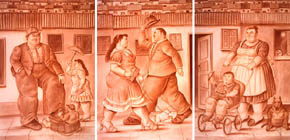
"Street Scene"
Triptych by Fernando Botero
Tyranny of Weight

"Street Scene"
Triptych by Fernando Botero
Tyranny of Weight
The human preoccupation with getting enough to eat for survival has been overcome, at least for most in our society. Now, our preoccupation is with eating too much and too much of the wrong kind of food. We have the alarming statistic that 30% of American adults and 20% of children are obese. Then, we have those who, although they are seriously underweight, feel they are overweight (anorexia nervosa) and those who over-consume food and then purge it (bulimia nervosa). For the rest, there is the persistent consciousness of weight: in the plethora of articles, books and dieting regimens, in the automatic scanning of food at meals to determine the number of calories, and in the habitual morning ritual of stepping on the scale. Such preoccupation leads me to believe we live under a 'tyranny of weight.'
Given the great emphasis on physical appearance and the ideal body image of excessive thinness for women and the rippling stomach muscles for men, the pursuit of bodily 'perfection' can lead to reliance on pills and on liposuction. Studies are now finding children as young as nine (fourth grade) dissatisfied with their body shape and desiring to lose weight.
With such calorie consciousness, how then do we explain the Big Texas Steak Ranch in Amarillo? There, on the way to Denver with a van full of youth, we stopped to eat. We watched one daring fellow as he took on the challenge of eating a 72-ounce (six pound) steak within an hour, along with salad, potatoes, etc., in order to get the meal free. (He failed and had to pay the $60.00 bill.) We watched as we had our steak, with salad, potatoes, vegetable, bread and drink--all after a long, sedentary day riding in the van.
One group that would not be too surprised at our preoccupation with food and weight is the medieval theologians. They saw the danger of the misuse of food and included, among their list of Seven Deadly Sins, Gluttony. For them the 'deadly' referred not to heart attacks but to the state of a person's soul, in this life and the next.
Gluttony received the usual fine tooth-comb examination as scholars and clerics held it up, allowing it to twist and turn in the wind. They delineated five paths of gluttony (I have added a possible modern equivalent): eating too soon (constantly snacking), too expensively (buying bottled water and frequently eating out), too much (ordering super size French fries), too eagerly (impatiently waiting in line to heap high our plates at a pot-luck or a smorgasbord), and too daintily (constantly fretting over calories and anorexia).
To be certain, gluttony, then and now, is associated with excessive or indiscriminate eating and drinking (the Latin root means 'to swallow' or 'to gulp down'). However, lest we think that all these pre-modern folk focused only on food, we find the sixteenth-century St. John of the Cross writing of spiritual gluttony, defining it as the disposition of those who, in prayer and other acts of religion, are always in search of "sensible sweetness." No cross, only sensible sweetness.
Thomas Paine, in another context, wrote, "Tyranny, like Hell, is not easily conquered." To the medieval theologians, to conquer one is to conquer the other. At table, we have a different response--'have some more.'